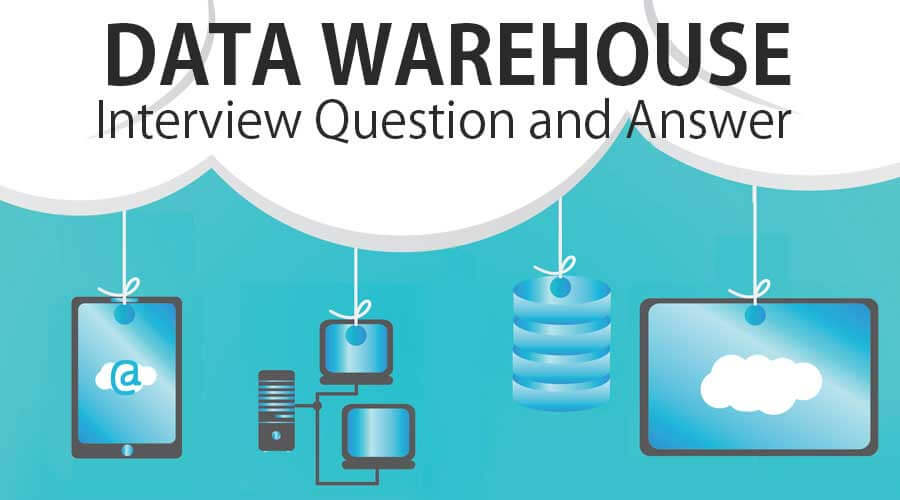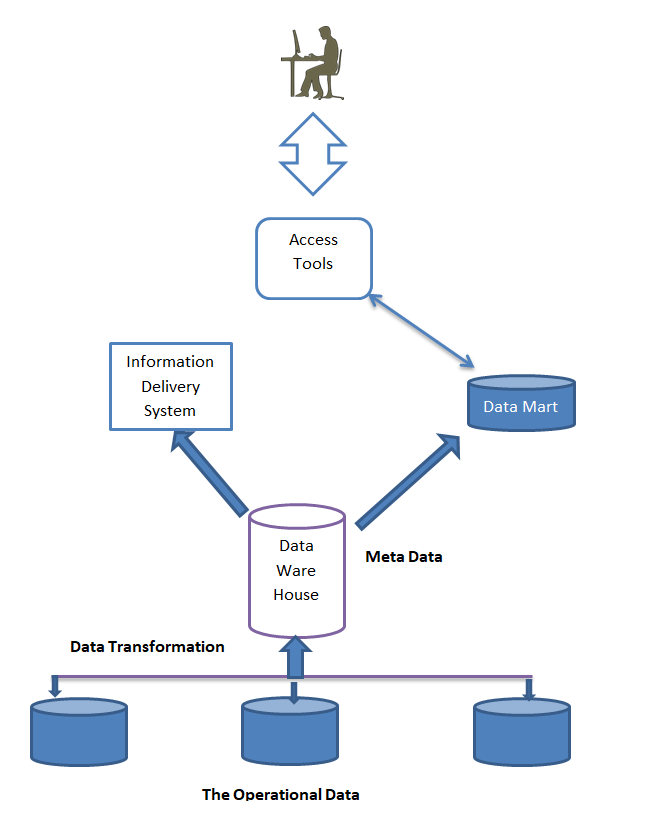Updated June 15, 2023
Introduction To Data Warehouse Interview Questions and Answers
A data warehouse is a domain for setting up data for building an information distribution center. Data Warehouse is nothing, but it collects data from different sources and provides an organization for making reports and analyzing the required data, keeping in mind the goal is to get the appropriate data. For these data, it is important to have these heterogeneous databases. The data that Data Warehouse has provided in such a presentation format that data can be termed out to be business intelligence or that helps the user in decision making to the relevant business ideas.
Preparing for a job interview in a Data warehouse. I am sure you want to know the most common 2023 Data warehouse Interview Questions and answers that will help you crack the Data warehouse Interview with ease.
This Data Warehouse Interview Questions article will present the 24 most important and frequently used Data warehouse interview questions updated for 2023. These questions will help students build their concepts around the Data warehouse and help them ace the interview.
Part 1 – Data Warehouse Interview Questions (Basic)
This first part covers basic Interview Questions and Answers
1. What is the data warehouse?
Answer:
A data warehouse is a domain for setting up data. The inspiration for building An information distribution center is that corporate information is regularly scattered crosswise over various databases and potentially in various configurations. Keeping in mind the end goal to get a total piece of data, it is important to get to these heterogeneous databases, acquire odds and ends of fractional data from every one of them, and after that, set up together odds and ends to create a general picture.
2. Data warehouse operational systems?
Answer:
The data warehouse operational system gives a prompt spotlight on business capacities and commonly keeps running in an online exchange preparing (OLTP) registering condition. The databases related to these applications are required to help many exchanges once daily. Regularly operational databases are required to fill in as quickly as could be expected under the circumstances. Methodologies for expanding execution incorporate keeping these operational information stores little centering the database on a particular business territory or application.
3. What is the difference between operating and data warehouse systems?
Answer:
The operational system depends on the environment, whereas the data warehouse system depends on the availability of database contents and their size for processing. Operational system costs were expensive to store and distribute data, whereas a data warehouse system is less expensive and stores electronically collected data.
4. Application of data warehousing system?
Answer:
Consistent and Quality of data: The data warehouse system is consistent and cost-effective for various industries for collection of their customer data through various resources
Cost reduction: A data warehouse system reduces cost by storing all electronically collected data in a data warehouse
Accessibility: A data warehouse system data can have easy access to data from time to time for business improvement and reporting.
Let us move to the next Data warehouse. Interview Questions.
5. Explain data warehouse architecture?
Answer:
The data warehouse architecture is based on a relational database management system. In the data warehouse architecture, operational data and processing are completely separate from data warehouse processing. This central information repository is surrounded by a number of key components designed to make the entire environment functional, manageable, and accessible by both the operational systems that source data into the warehouse and by end-user query and analysis tools.
6. What is the concept of data transformation in a data warehouse?
Answer:
In a data warehouse, the data transformation concept is an extraction of data from the operating system and putting it in a suitable format for information application in a data warehouse. Removing unwanted data from operational databases. Converting to common data names and definitions. Calculating summaries and derived data. Establishing defaults for missing data. Accommodating source data definition changes.
7. Expand EIS in data warehouse technology and Brief about it.
Answer:
Executive Information Systems: The tools are used to transform information and present that information to users in a meaningful and usable manner. They support advanced analytical techniques.
And free-form data exploration allows users to transform data into information easily. EIS tools tend to give their users a high-level summarization of key performance measures to support decision-making.
8. Expand OLAP in data warehouse technology and Explain?
Answer:
Online Analytics Processing: These tools are based on concepts of multidimensional databases and allow a sophisticated user to analyze the data using elaborate, multidimensional, and complex views. Typical business applications for these tools include product performance and profitability, the effectiveness of a sales program or a marketing campaign, sales forecasting, and capacity planning. These tools assume that the data is organized in a multidimensional model, which is supported by a special multi-dimensional database or by a Relational database designed to enable multidimensional properties.
9. What is data mining?
Answer:
Data mining can be defined as the process of discovering meaningful new correlations, patterns, and trends by digging (mining) large amounts of data stored in a warehouse using artificial intelligence (AI) and/or statistical/mathematical techniques. The major attraction of data mining is its ability to build predictive rather than retrospective models. Using data mining to build predictive models for decision-making has several benefits.
10. Name some data mining tools used in the data warehouse systems?
Answer
Orange Data Mining, R software Environment, WEKA Data Mining, RapidMiner, KNIME.
11. What is data visualization?
Answer:
Data warehouses are causing a surge in the popularity of data visualization techniques for looking at data. Data visualization is not a separate class of tools; rather, it is a method of presenting the output of all the tools in such as Orange Data Mining, R Software environment, WEKA Data Mining, etc.. a way that the entire problem and/or the solution (e.g. a result of a Relational or multidimensional query, or the result of data mining) is clearly visible to domain experts and even casual observers.
12. Name some data visualization tools for presenting data reports?
Answer:
Tableau, ZingChart, Tibco Spotfire, Google Chart, Sigma Plot, Mini Tab
Part 2 – Data Warehouse Interview Questions (Advanced)
Let us now have a look at the advanced Interview Questions and Answers
13. Explain in brief Data Mart?
Answer:
A data mart is a concept in a data warehouse for partitioning the stored data of a specific industry. A data mart could be a denormalized, summarised, or aggregated data set. Datamart can incorporate different techniques like OLAP or data mining.
14. What are the languages used in Data cleansing?
Answer:
R – Programming language, SQL- Structure Query Language, Advance Excel Macros.
15. How will you do data transformation in the data warehouse platform?
Answer:
After setting up the environment using SQL with the support of Shell scripting language, the data will be able to transfer to the data warehouse system.
16. Techniques used in data transformation?
Answer:
SQL: Structured Query Language is mainly used for data transformation. By using a SELECT command of Structure query language and from shell scripting language SCP and SSH command is used to connect to the data warehouse server for data transformation.
Let us move to the next Data warehouse. Interview Questions
17. What are the available tools used in data transformation?
Answer:
MySQL Tools such as MySQL Workbench, MySQL Server, MySQL Clients, MySQL Installer, MySQL Connector, MySQL Migration Tool Kit, MySQL Query Browser, MySQL Administrator, MySQL System Tray Monitor
18. What do you call data warehouse schema?
Answer:
The data warehouse schema is called a star schema.
19. What is the benefit of a data warehouse system in business intelligence?
Answer:
Data warehouse systems very much benefited from business intelligence by processing sales reports. This sales report can be collected from different sources and stored in a data warehouse for analytics and reporting to understand the business and its improvement. For the sales improvement of a business data warehouse, technology is essential.
20. What is the application of a data warehouse platform in the healthcare industry?
Answer:
Data warehouse systems greatly benefit the Healthcare industry by processing genomic and proteomic analysis. For better drugs and drug improvement, data warehouse technology is essential.
21. How can a doctor get benefited from data warehouse technologies?
Answer:
The data warehouse system greatly benefited the hospital industry by processing patient reports. For patient disease improvement and betterment in treatment, data warehouse technology is essential to store report and track reports.
22. What is the application of a data warehouse platform in political science?
Answer:
Data warehouse system very much benefits from political science for processing, ID proof tracking, and categorizing enrollment of election data. For the economic improvement of a country data warehouse technology is essential.
Let us move to the next Data warehouse Interview Questions.
23. How can a political leader get benefited from data warehouse technologies?
Answer:
Data warehouse systems greatly benefited the political industry by processing voter reports. This voter report can be collected from different sources and stored in a data warehouse.
24. How can the Banking sector get benefit from data warehouse technologies?
Answer:
Data warehouse system is very much benefited in the banking industry by processing shares and investment report. Data warehouse technology is essential to store reports and track reports for risk management and fraud management and to provide loan credit cards to get more interest in support to the banking sector and industry.
Recommended Articles
This has been a guide to the List Of Data warehouse Interview Questions and answers so that the candidate can crack down on these Interview Questions easily. In this article, we have compiled the set of Data warehouse Interview Questions to make it easy for you in an interview. You may also look at the following articles to learn more –




